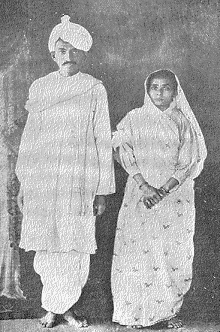| A hero’s welcome awaited Gandhi when he landed on January 9, 1915, at the Apollo Bunder in Bombay. Three days later he was honoured by the people of Bombay at a magnificent reception in the palatial house of a Bombay magnate Jehangir Petit. The Government of India joined with the people of India in showering honours on Gandhi. He received a "Kaiser-I-Hind"gold medal in the King’s birthday honours list of 1915. His association with Gokhale was guaranteeenough of his being a safe politician. Of course, he had led an extra-constitutional movement in South Africa, defied laws and filled gaols, but the cause for which he had fought appeared as much humanitarian as political, dear to all Indian as and all Englishmen whose sense of humanity had not been blunted by racial arrogance or political expediency. Lord Hardinge’s open support of the Satyagraha movement had in any case removed the stigma of rebellion from South Africa’s Indian movement. |
| Gandhi was in no hurry to plunge into politics. His political
mentor on the Indian scene was Gokhale. One of the first things Gokhale did was to extract
a promise from Gandhi that he would not express himself upon public questions for a year,
which was to be a "year of probation". Gokhale was very keen that Gandhi should
join the Servants of India Society in Poona. Gandhi was only too willing to fall in with
the wishes of Gokhale, but several members of the Society feared that there was too great
a gap between the ideals and methods of the Society and those of Gandhi. While the
question of his admission as a ‘Servant of India’ was being debated, Gandhi
visited his home towns of Porbandar and Rajkot and went on to Santiniketan in West Bengal,
the cosmopolitan University of the Poet Rabindranath Tagore.
The trip to Santiniketan ended abruptly with a telegram from Poona that Gokhale was dead. Gandhi was stunned. He mourned Gokhale by going barefoot for a year, and out of respect for the memory of his mentor, made another effort to seek admission to the Servants of India Society. Finding a sharp division of opinion in the Society on this point, he withdrew his application for admission. During 1915—the year of probation—Gandhi eschewed politics severely. In his speeches and writings he confined himself to the reform of the individual and the society and avoided the issues which dominated Indian politics. His restraint was partly due to self-imposed silence and partly to the fact that he was still studying conditions in India and making up his mind. |
